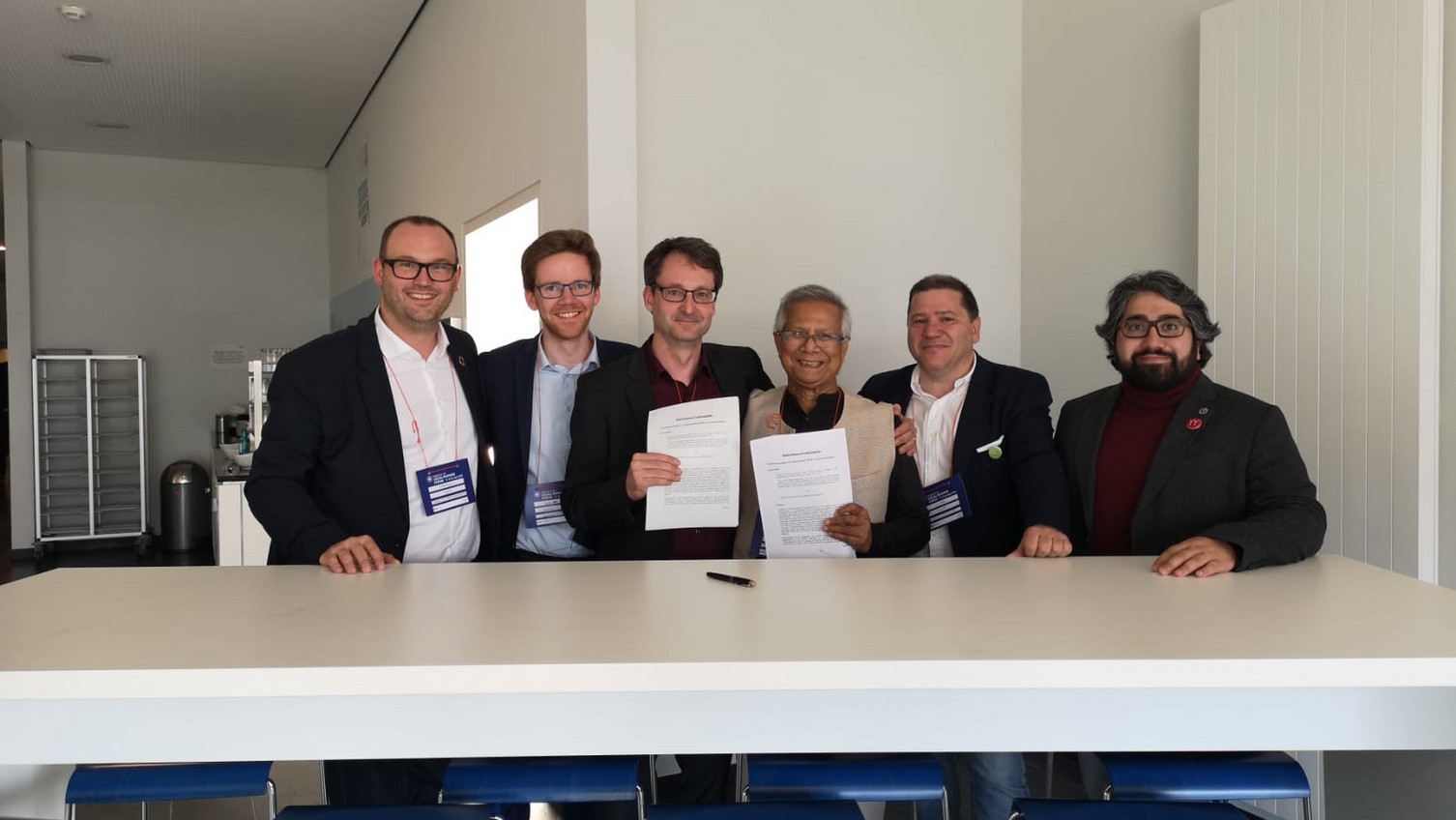Yunus Centre for Social Business and Values
The Yunus Centre for Social Business and Values (YCSB) is an inter- and transdisciplinary center at Leuphana University Lüneburg. It is part of a network of 82 Yunus Centres around the world inspired and supported by Nobel Peace Prize Laureate Prof. Muhammad Yunus. His mission is to create sustainable development through the theory of "three zeros": Zero poverty, zero unemployment, and zero net carbon emissions. The YCSB at Leuphana University was founded in 2019 at the initiative of Prof. Günther Strunk, Dominique Dauster, Manouchehr Shamsrizi and Prof. Markus Reihlen.
 ©Leuphana
©Leuphana
What is a Yunus Centre?
A Yunus Centre for Social Business is a hub for social business at universities around the world. There are currently 82 Yunus Centres for Social Business worldwide, coordinated through the Yunus Centre in Dhaka. Yunus Centres for Social Business are established to disseminate the concept and practice of social business among university students and researchers, as well as in the community. Yunus Centre for Social Business strive to conduct research, teaching and transfer activities for more knowledge sharing and acquisition in the field of social business, for example, through competitions, workshops and seminars.
What is a social business?
Prof. Yunus defines a social business as a company established for the sole purpose of addressing a social or environmental problem. Social businesses use entrepreneurial solutions to solve that problem. This means that, unlike NGOs, a social business finances itself through its business model and is not subsidized by donations or grants. Profits can only be made as long as they are reinvested to solve the problem and not distributed as dividends to shareholders and investors. This is how social businesses differ from profit-oriented companies.
The concept of social business must be distinguished from the related concepts of social entrepreneurship and social enterprise. The core idea of social entrepreneurship (as a process) and social enterprises (as the organization emerging in the process) is also to solve social or environmental problems through innovative and entrepreneurial approaches. However, their definition reaches much further than the definition of social business. A social enterprise can be a charity and/or it can be a for-profit business that produces both personal profits and social value. Social businesses are thus a small subset of social enterprises and social entrepreneurship. To distinguish the concepts terminologically as well, we refer to social business entrepreneurs, social business entrepreneurship, and social business as opposed to social entrepreneur, social entrepreneurship, and social entreprise. At the Leuphana YCSB, we consider the entire spectrum of social entrepreneurship with a special focus on social business entrepreneurship.
Our Vision
At Leuphana YCSB, we strive to provide students, researchers and entrepreneurs with the necessary knowledge, skills and passion to build and explore social enterprises through research, teaching and transfer activities. In our work, we focus on the moral values of entrepreneurs who start a social enterprise and on the social, environmental and economic value creation that results from social entrepreneurship.
Team
The Leuphana YCSB bundles its expertise in various roles. The board of directors is Prof. Michael Gielnik, Prof. Jacob Hörisch and Prof. Markus Reihlen. Operational management and coordination is handled by Frederic Penz. In March 2021 Maren Fokuhl joined the team as part of the Social Innovation Thinkathon project.
In addition, the Leuphana YCSB has both an advisory board, consisting of practitioners and academics, and a board of sponsors. The Advisory Board advises and supports the management with a special focus on research and development, while the sponsors support the YCSB materially and/or ideationally in achieving its goals. In addition, there are two fellowship programs at the Leuphana YCSB. The Leuphana YCSB Fellowship Program brings together social entrepreneurs from the region and around the world to share their experiences and pass them on to the next generation of social entrepreneurs. Our Research Fellows are researchers who contribute to the study of social entrepreneurship and collaborate with the YCSB.
Other Institutions
Leuphana University offers students interested in start-ups and sustainability many other opportunities for support.
The Social Change Hub (SCHub) is a platform that aims to promote and support student engagement in the sense of social entrepreneurship. Therefore, the SCHub offers a central contact point for student to socially engage, which, in addition to its own offers, focuses very strongly on networking within and outside the university.
The Entrepreneurship Hub links the diverse activities of Leuphana University on the topic of entrepreneurship. The Hub is the central point of contact on the topic of start-ups and provides cross-faculty impulses for research and teaching, consulting services and start-up projects.
The Start-up Service supports those interested in founding a company by providing individual advice, qualification and funding. In addition, it ensures optimal networking with all actors in the regional start-up sector, also outside the university, and helps in the search for investors.
The Centre for Sustainability Management (CSM) analyzes causes, structures and processes of environmental, societal and sustainability problems using methods from management sciences, entrepreneurship and environmental and sustainability sciences. Based on this, the CSM develops concepts and sustainability solutions for companies, the economy and society.
Contact
Prof. Dr. Markus Reihlen
Universitätsallee 1, C6.416
21335 Lüneburg
Fon +49.4131.677-2350
markus.reihlen@leuphana.de
Prof. Dr. Jacob Hörisch
Universitätsallee 1, C11.402
21335 Lüneburg
Fon +49.4131.677-2260
jacob.hoerisch@leuphana.de
Prof. Dr. Michael Gielnik
Universitätsallee 1, C6.408
21335 Lüneburg
Fon +49.4131.677-2105
michael.gielnik@leuphana.de
